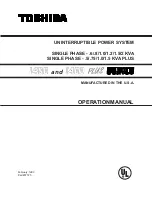
TECHNICAL MANUAL
942088.001
942088.001 - 24/09/98
8
5.2 Charger block and internal mains
The L and M terminals are connected to the transformer winding charger. This signal
is rectified with D4, D3, T4 and T5. IC5 regulates the charger voltage in function of the
voltage of the ADJ pin. With IC2B, the micro can stop the charger. The control of the
charger current is made with R19, R20, R21 and R22.
The battery or IC5 supply the voltage for the internal circuits. IC3 output supplies five
volts.
5.3 Start up circuits.
When there is mains voltage, the transformer TR1 voltage switches T3 on, T1 is also
switched on and IC3 supplies 5V.
When the mains is cut off or out of range, the microprocessor supplies voltage to PB0
during “STAND-BY”.
5.4 Reset Circuits.
This circuit makes a reset to the microprocessor when the 5V supply drops bellow the
security level. IC2A compares supply voltage, through R33 and R34, with a reference
of 0,6V fixed by D1 and R32.
5.5 Output Block.
The A, B, S and N, C, D are the UPS output terminals. When the unit works with
mains RL2 and RL3 (Back-Feed relays) are activated, when it’s on-battery RL2 and
RL3 aren’t activated.
RL1 controls the steps (Central and Boost). In normal operation the RL1 isn’t activated
and the unit is in the central step. When the input voltage is low the boost step is
activated (RL1).
5.6 Power Block.
It is a Push-Pull converter ( T7, T10 and T8, T9 ) and Null ( T4 and T5 ). With IC4A,
IC4B and IC4C the micro controls the power MOSFET.
5.7 Protection Circuit for VDSon.
With this circuit the micro studies the MOSFET current when the unit is on-battery.
IC2C compares the VDSon with a reference voltage fixed by R12 and R46, so that if
the VDSon is higher than the reference voltage, IC2C sends an interruption to the
micro. IC2D initialises the protection in each branch.



























